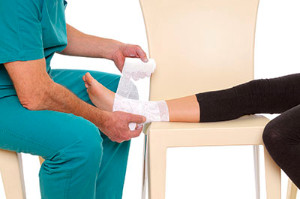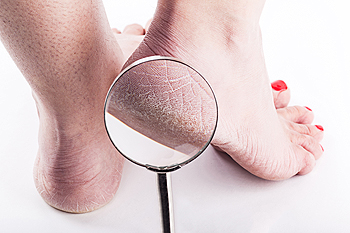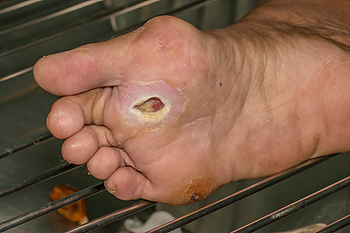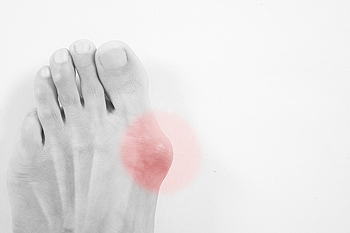 If you have endured an ankle sprain, it may have happened as a result of suddenly rolling your ankle. This can occur from stepping off of a curb unexpectedly, or from tripping on an unseen object. An eversion sprain generally targets the inner part of the ankle, and may affect the arch of the foot. If the ankle rolls outward, it is known as an inversion sprain, and may cause the ligaments to stretch or tear. There are common symptoms that are associated with ankle sprains. These can include severe pain and discomfort, swelling, and it may be difficult to move or bend the ankle. Moderate relief can be found if the affected foot is taped with an elastic bandage, and this may help to provide the support that is needed as the healing process takes place. If you have sprained your ankle, it is strongly suggested that you seek the counsel of a podiatrist who can guide you toward the correct treatment.
If you have endured an ankle sprain, it may have happened as a result of suddenly rolling your ankle. This can occur from stepping off of a curb unexpectedly, or from tripping on an unseen object. An eversion sprain generally targets the inner part of the ankle, and may affect the arch of the foot. If the ankle rolls outward, it is known as an inversion sprain, and may cause the ligaments to stretch or tear. There are common symptoms that are associated with ankle sprains. These can include severe pain and discomfort, swelling, and it may be difficult to move or bend the ankle. Moderate relief can be found if the affected foot is taped with an elastic bandage, and this may help to provide the support that is needed as the healing process takes place. If you have sprained your ankle, it is strongly suggested that you seek the counsel of a podiatrist who can guide you toward the correct treatment.
Ankle sprains are common but need immediate attention. If you need your feet checked, contact one of our podiatrists from Foot Health Center of Merrimack Valley. Our doctors can provide the care you need to keep you pain-free and on your feet.
How Does an Ankle Sprain Occur?
Ankle sprains take place when the ligaments in your ankle are torn or stretched beyond their limits. There are multiple ways that the ankle can become injured, including twisting or rolling over onto your ankle, putting undue stress on it, or causing trauma to the ankle itself.
What Are the Symptoms?
- Mild to moderate bruising
- Limited mobility
- Swelling
- Discoloration of the skin (depending on severity)
Preventing a Sprain
- Wearing appropriate shoes for the occasion
- Stretching before exercises and sports
- Knowing your limits
Treatment of a Sprain
Treatment of a sprain depends on the severity. Many times, people are told to rest and remain off their feet completely, while others are given an air cast. If the sprain is very severe, surgery may be required.
If you have suffered an ankle sprain previously, you may want to consider additional support such as a brace and regular exercises to strengthen the ankle.
If you have any questions please feel free to contact one of our offices located in North Andover, and Tewksbury, MA . We offer the newest diagnostic and treatment technologies for all your foot and ankle needs.














